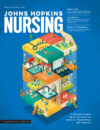“Night shift work has historically been associated with circadian rhythm changes, health risks, and even emotional effects.” It also, apparently, can lead to more nursing errors, according to “Is There a Relationship Between Night Shift and Errors? What Nurse Leaders Need to Know,” a review of literature
by Assistant Professor Vickie Hughes, DNS, MSN, RN.
Medical errors and preventable patient infections and injuries together make up the third-leading cause of death in the United States, a startling statistic. A search of literature published between May 1, 2005 and May 1, 2015 suggests the error rate on night shift was consistently higher than that of day shift nurses. Contributing factors in “both near misses and adverse events” included years of exposure to night work, increased frequency of night shifts, and time pressures, according to Hughes’ study.
She notes that previous studies have also shown that night shift nurses complain significantly more about difficulties falling asleep, daytime sleepiness, headaches upon waking, anxiety, and depression. Hughes explains, however, that “there was not any significant association between the ‘adaptive nurses’ and the ‘non-adaptive’ nurses in regard to reported clinical error and adverse patient incidents. In other words, the nurses who developed symptoms of poor coping with rotating night shift work did not commit any more errors than the nurses who adapted well to night shift work.”In fact, previous studies have suggested that the rotating nature of shifts might be as big a factor as the time change, including research that showed nurses who worked only two consecutive night shifts suffered greater “perceptual and motor ability impairment” than colleagues who worked four consecutive night shifts.“In other words, the nurses who developed symptoms of poor coping with rotating night shift work did not commit any more errors than the nurses who adapted well to night shift work.”
— Vickie Hughes, DNS, MSN, RNThe good news is that hospitals and nursing organizations are waking up. “The [American Nursing Association in 2014] published a position statement on the nurse responsibility regarding fatigue. Some hospitals are beginning to implement fatigue management programs that focus on a shared responsibility between nurses and supervisors to prevent incidents related to fatigue. Some of these fatigue management programs restrict the number of hours the nurse can work during a shift or during a work week. Most programs are restricting the hours a nurse may be on call outside the normal work day.”
Publication: Athens Journal of Health

